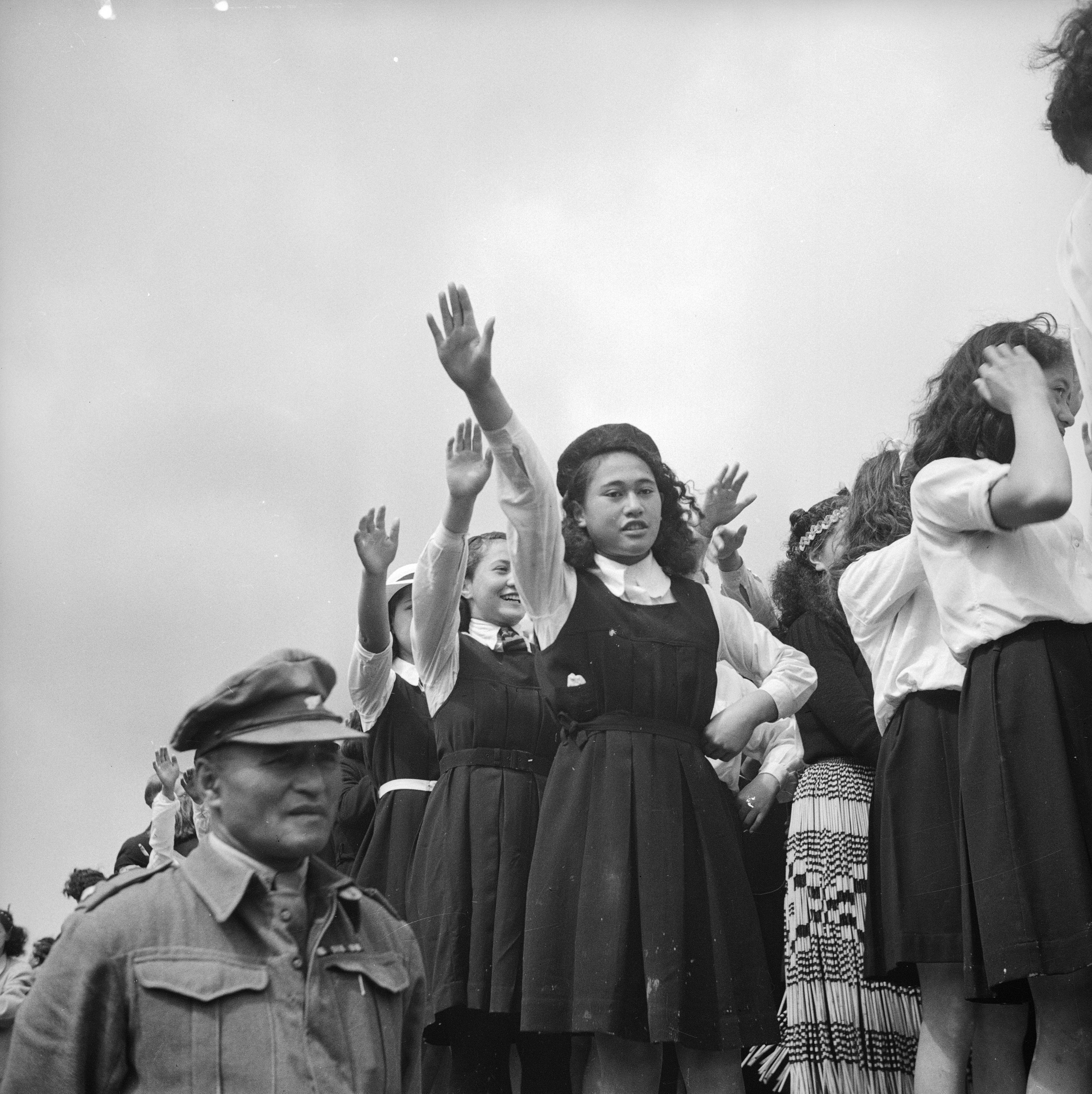
The Ngarimu Victoria Cross Investiture Meeting and Reception to His Excellency the Governor General, 6 October 1943.
On 4 June 1943 news was broadcast world-wide that 2/Lt Te Moana-nui-a-Kiwa Ngarimu had been awarded the Victoria Cross for his role in the attack on Point 209 at Tebaga Gap, Tunisia. It was the sixth VC to be awarded to a New Zealander in the war, and the first to a Maori soldier.
The public investiture ceremony where the Governor-General presented the award to Mr & Mrs Hamuera Ngarimu was held at Whakarua Park in Ruatoria, Ngarimu’s home town. At the time it was one of the largest and most fully documented Māori gatherings ever held.[1] Despite the rain and mud, 7000 people attended the event, including the Prime Minister and other parliamentarians, Battalion members on furlough, Home Guardsmen and 1300 schoolchildren, who came from all parts of the country. Three hundred performers had been brought together from the Gisborne district alone. Te Whānau-ā-Apanui and Ngāti Porou, led by Sir Apirana Ngata hosted the event that featured five hours of entertainment. Members of the National Film Unit, the official Government photographer - John Pascoe, and the press documented the event. Cameramen from the US Marine Corps also headed to Ruatoria to record the event. Read more about the event here.
This recording of the song was made on the morning of the investiture at Whakarua Park.
Transcript
Sir AT Ngata: Ngarimu VC recording number 4A. This item was given by about a thousand schoolchildren from all parts of New Zealand at the Ngarimu Investiture ceremony in October 1943. It was selected because it was topical and because of its wide vogue amongst the children of the Native Schools. It is reported that the song originated at Nuhaka. [1] The commentator heard it at Rotorua and it should now be well on its way to the far north. The theme has inspired many contemporary writers including the author of “The Great Dictator.” The piece is reminiscent or is a modern version of the cursing song or kaioraora and the children render it with the vigour and gusto of their forefathers. The Maori text suits the action although it adopts foreign expression often heard in the highest Pakeha society.
Here is the rendering in English. The title is “Hitler, the frothy mouthed.”
Hitler, the frothy mouthed, hard-headed man,
Obstinately determined to fight,
Defeated repeatedly on Russian’s soil’
He was given the works. Hei, aue, aue!
Chorus: Raise it aloft! Lift it on high!
So that my weapon shall break on his head.
Strike then, my son, bash in the jaw of
That thrice accursed slave, Hitler!
Musso has heard of that fiery ball
Down from under threatening Rome;
Swift be the onset, lest he escape.
Lo! He is shivering with dastardly fear.
Sir AT Ngata: Now Mr Mason I am sure we are tremendously obliged to your department. for having brought here today over 500 children from outside this district, 200 from the inner district and about 600, nearly 1300 ranged up there, school teachers from all over the dominion. Applause. I suppose in no part, in no Maori community, is there so much appreciation of what this day means to our people than the young folk in front of you representing every native school between the North Cape Te Hapua and Okautete on the Wanganui Coast. I want to apologise to the school teachers. I know a number of them have had to rough it. I’m sure they’ll, they’ll let the occasion be the main justification for the rough time they’ve had. Now that you’re all here, Mr Alexander and the other teachers, Miss Kinross and the women teachers here we are very glad to see you here taking your part, and a very worthy part, in the demonstration in honour of the award to the Maori Battalion not only of the Victoria Cross but of the other distinctions which are portrayed in flowers by the young ladies here in front of the stage. Hitara Waha Huka. Go back to the children’s items in the red booklet number three - Hitara Waha Huka. The translation explains it all. I’ve toned down the swear words which you couldn’t get the children to get out of their heads. Laughter. Now then. Tahi, rua, toru, wha.
Children sing Hitara Waha Huka twice.
Hitara waha huka, upoko maro,
He tangata tohetohe kite riri, e!
Hinga atu, hinga mai i runga o Ruhia!
Ka purari ana mahi! Hei! Aue! Aue!
Ch: Tuhikitia ra, tuhapainga mai
Te rau o taku patu ki runga ki te upoko!
Hoatu, e tama, karia te kauae o
Te purari paka nei a Hitara e!
Kua rongo Mussolini, kua tata tonu mai!
A Te Hokowhitu Toa ki Roma, e.
Hiki nuku, hiki rangi! Kore rawa he rerenga,
Ka wiri ona papa i te mataku, e!
[1] Mrs Ata Pedersen in pers. comm: named the composer as Rev Wii Moana. First performed at Takitimu Meeting House, Wairoa, mid 1941, by concert group of the Mutual Improvement Association, Church of the Latter Day Saints. Tune: Click go the Shears. Reference: Archive of Māori and Pacific Music , The University of Auckland Library. See http://ampm.auckland.ac.nz/handle/id/73078 9 April 2013.
Site editors notes:
- There is intermittent static throughout the audio
- A question mark (?) after a word indicates audio is inaudible
Sound file from Ngā Taonga Sound & Vision. Any re-use of this audio is a breach of copyright.
Image reference
Alexander Turnbull Library
Reference: 1/4-000690-F
Date: 6 Oct 1943
School children perform 'Hitara Waha Huka" during the VC hui.
Further information and copies of this image may be obtained from the Library through its 'Timeframes' website, http://timeframes.natlib.govt.nz
Permission of the Alexander Turnbull Library, National Library of New Zealand, Te Puna Matauranga o Aotearoa must be obtained before any reuse of this image.

Takupu (0)